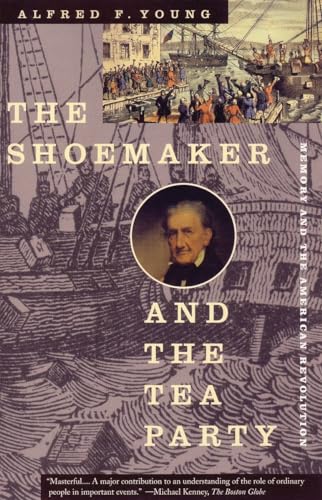The Shoemaker and the Tea Party: Memory and the American Revolution
Alfred F. Young
About the Book
Description:
Connecting readers with great books since 1972! Used books may not include companion materials, and may have some shelf wear or limited writing. We ship orders daily and Customer Service is our top priority!. Seller Inventory # S_387618962
About this title:
Synopsis: George Robert Twelves Hewes, a Boston shoemaker who participated in such key events of the American Revolution as the Boston Massacre and the Tea Party, might have been lost to history if not for his longevity and the historical mood of the 1830's. When the Tea Party became a leading symbol of the Revolutionary ear fifty years after the actual event, this 'common man' in his nineties was 'discovered' and celebrated in Boston as a national hero. Young pieces together this extraordinary tale, adding new insights about the role that individual and collective memory play in shaping our understanding of history.
Review: On December 16, 1773, some 150 men boarded three ships docked at Griffin's Wharf. Dressed as Mohawks, their faces darkened with soot, the men cracked open chests of tea and threw them into Boston Harbor. What began as a protest against the duty on tea became an icon of the American Revolution. But what did the Boston Tea Party mean to its participants? Indeed, what did the Revolution mean to the ordinary person? In The Shoemaker and the Tea Party, Alfred F. Young tells the story of George Robert Twelves Hewes, who was involved in several events in Boston during the Revolution. In 1835, when Hewes was in his 90s, he was celebrated as one of the last survivors of the Tea Party.
The Shoemaker and the Tea Party comprises two linked essays. The first is about Hewes (whom Young describes as "a nobody who briefly became a somebody in the Revolution and, for a moment near the end of his life, a hero"), his memories, and what these memories reveal about the meaning of the Revolution for him. "For a moment he was on a level with his betters. So he thought at the time, and so it grew in his memory as it disappeared in his life." The second essay follows the lead of Michael Kammen and Eric Hobsbawm by looking at the dichotomies of public vs. private and popular vs. official memory, and the external forces that shape these memories into "tradition." Young does an excellent job of illustrating his theory with experiences from Hewes's life, newspaper accounts, and contemporary prints. This book will interest both scholars and general readers, though Young does presume some prior knowledge of the Revolution on the part of the reader. A thought-provoking look at the nature of memory, history, and tradition. --Sunny Delaney
Bibliographic Details
Title: The Shoemaker and the Tea Party: Memory and ...
Publisher: Beacon Press
Publication Date: 2000
Binding: Paperback
Condition: Very Good
